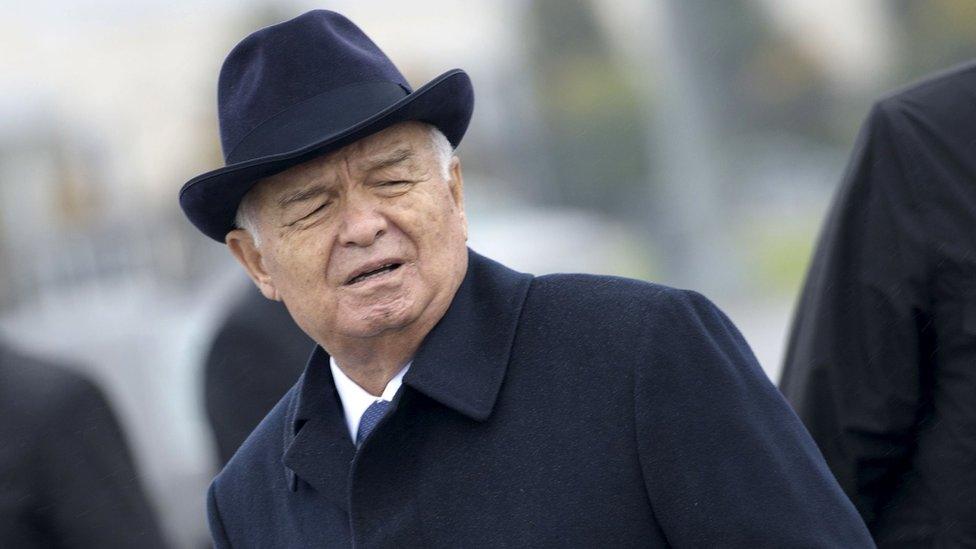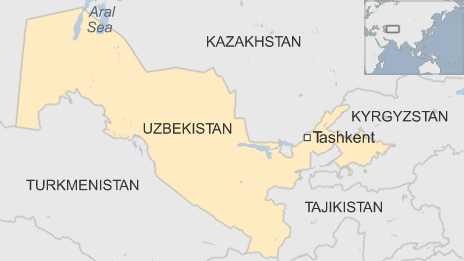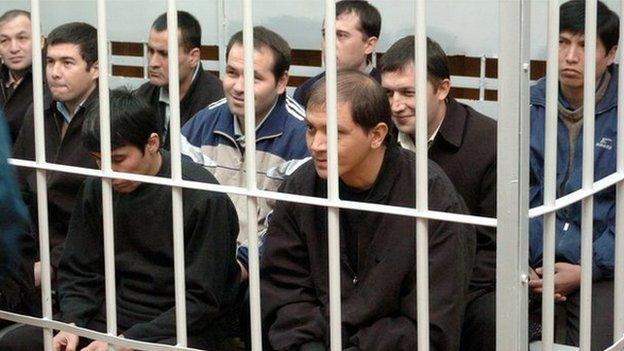How IS threat strengthens authoritarianism in Central Asia
- Published

President Islam Karimov says IS raises the threat of "belligerent extremism and religious radicalism"
There is one serious and not so obvious threat that many countries face when dealing with the so-called Islamic State.
The militants' activity is not limited to attacking Western capitals, bombing planes or shooting peaceful citizens.
But when fighting such radical groups, governments may also, intentionally or not, strengthen authoritarian regimes and undermine democratic values.
A vivid example of this is Uzbekistan. This Central Asian nation is considered to be one of the most repressive states in the world.
Independent watchdog organisation Freedom House ranks it in the same category as North Korea - the "worst of the worst", external when it comes to political rights and civil liberties.
Uzbekistan's President Islam Karimov has warned that IS is approaching the country's borders, raising the threat of "belligerent extremism and religious radicalism" in the region.
According to the estimates of the International Centre for the Study of Radicalisation and Political Violence, about 500 Uzbekistan citizens, from a nation of just under 30 million, have joined militants in Syria and Iraq.
But other than some isolated attacks, the threat IS and other jihadist groups pose for Uzbekistan seems to be very limited. Their ideology does not appeal to almost the entire population of Central Asia, where Islam is very secular, a legacy of the atheistic Soviet past.

Many people know next to nothing about the Sunni-Shia split and this sectarian divide is largely absent there.
The growing number of mosques and increased observance of Islamic rituals are often mistakenly taken as signs of radicalisation.
Anti-IS campaign
But as John Heathershaw, associate professor at the University of Exeter, and David Montgomery from the University of Pittsburgh argue in a research paper published by the Chatham House think tank,, external Islamisation does not mean radicalisation and "there is little or no evidence of significant levels of Islamic extremism and political violence" in Central Asia.
Yet a whole campaign focusing on IS has been launched in Uzbekistan, clearly with permission, or perhaps a direct order, from the president's office.
Muslim clergy and government officials discuss the threat of terrorism and religious extremism on TV talk shows. Films and plays illustrate the evils of jihadism. Community leaders appeal to the youth not to join militant groups like IS.
This is all odd because Uzbekistan's government never acknowledges any problems it faces. "Uzbekistan is the state with a bright future" is its main propaganda slogan, so discussing social problems is a taboo.

Uzbekistan
The land that is now Uzbekistan was once at the heart of the ancient Silk Road trade route connecting China with the Middle East and Rome
The country spent most of the past 200 years as part of Russia, and then the Soviet Union, before emerging as an independent nation in 1991
Under President Islam Karimov, in power since 1989, Uzbekistan has boasted of steady economic growth based on exports like cotton, gas and gold
But the political system is highly authoritarian and its human rights record widely decried
There is no legal political opposition and the media is tightly controlled by the state
A UN report has described the use of torture as "systematic"

There are no films or plays depicting poverty in the country. There are no talk shows discussing corruption in state institutions. There are no community leaders who openly talk about the use of forced child labour.
Creating fear
So why did the government launch a whole campaign about IS?
It is simple. The government is creating in people's minds an image of the only possible alternative to the existing regime. After watching a video about IS fighters, one Uzbek citizen told me: "If our president leaves, then these crazy Islamists will come to power in Uzbekistan."
This threat from IS justifies tightened security measures. It allows the state to spy on citizens, make illegal arrests and use torture to crush any dissent. It also discourages citizens from challenging the government's actions.
Uzbek police have been increasingly raiding houses to question residents. In November, rights activists in Uzbekistan reported that more than 200 people had been arrested, external on suspicion of IS membership.

Allegations of torture and forced confessions surrounded the trial of 15 Uzbek men following the Andijan massacre in 2005 when troops fired into a crowd, killing hundreds
These arrests are not a new development, says Steve Swerdlow from Human Rights Watch. "There is a well-documented pattern of security services of Uzbekistan arresting largely peaceful independent Muslims and sentencing them to incredibly lengthy jail sentences without any evidence of wrongdoing."
What is new, Mr Swerdlow says, is the name of the group they are accused of belonging to - IS.
Past evidence
Indeed, the phrase "Islamic extremism" has been widely used in Uzbek propaganda before. But none of the organisations that appeared in the news until recently were as savage as IS.
And the bigger the danger in the eyes of the population, the easier it is to control them.
The threat of radical groups is not completely imaginary and some of those who were detained last month may indeed be connected to IS. But since Uzbekistan is so closed and does not allow any independent media or human rights organisations to assess the situation "we are left to make conclusions based on the overwhelming evidence of the past", says Mr Swerdlow.
Republic of Uzbekistan
Capital: Tashkent
-
Population 32 million
-
Area 447,400 sq km (172,700 sq miles)
-
Major languages Uzbek, Russian, Tajik
-
Major religion Islam
-
Life expectancy 68 years (men), 74 years (women)
-
Currency Uzbek som
However, why would the state arrest so many people under fake charges? It is unlikely that all these people were opposing the government, so they could hardly be dangerous for the regime.
Again, these mass arrests help to create fear. The government is trying to convince its people that those jihadists are posing an imminent threat, that they have reached the country's borders and even infiltrated society.
People may not be happy with their impoverished lives and the repressive state but when they believe that the alternative is IS, they accept the existing order. As a result, they do not protest against illegal arrests, rampant poverty or daily problems such as the absence of heating.
And this is exactly what authoritarian regimes want.
It is important to note that fear can corrupt not just authoritarian states but mature democracies too.
It creates an environment where it seems logical to abandon some democratic principles for the sake of national security. But as history shows, this method only creates more problems than solutions.